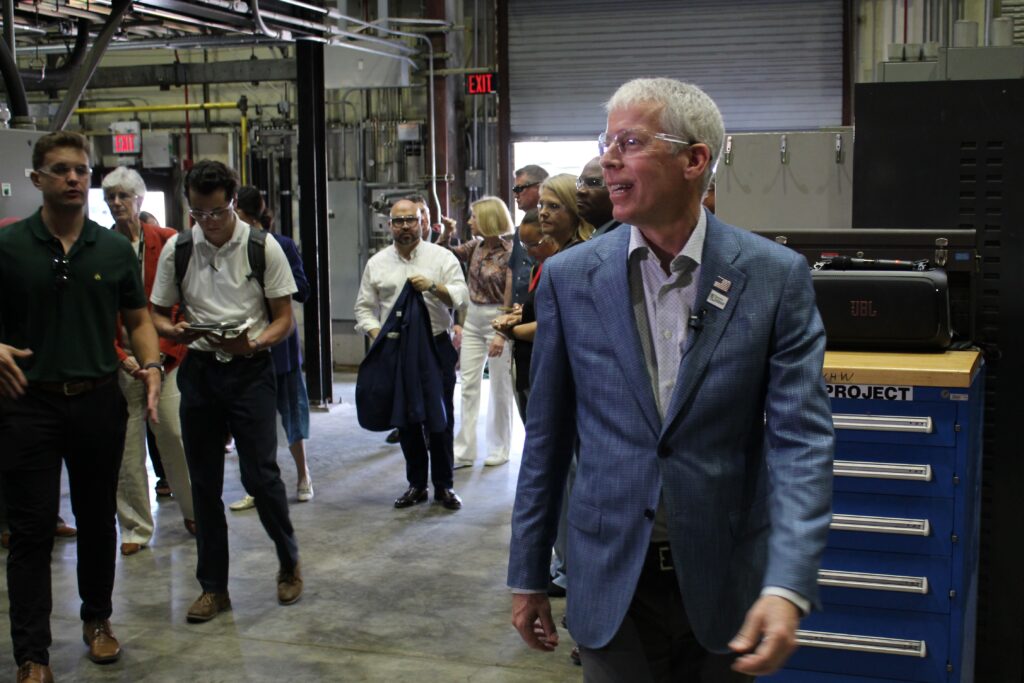U.S. Department of Energy Secretary Chris Wright visited the National Energy Technology Laboratory in Morgantown Wednesday to learn more about their work on energy technology development, carbon management and more.
Wright stressed the need for reliable electricity, and the importance of West Virginia’s fuel production for American production and expansion into emergent technology like artificial intelligence.
“West Virginia is a major producer of natural gas liquids. The third fastest growing energy source globally over the last 14 years is coal,” he said. “So West Virginia is a powerhouse in natural gas, a powerhouse in natural gas liquids and a powerhouse in coal.”
Some 40 coal-fueled power plants are slated to be shuttered across the country, most of which Wright said he plans to stop. However, he conceded reopening already closed coal-fired power plants is more difficult.
“One of the things I did as Secretary of Energy is I have emergency authorities, and I can stop the closure of power plants, because it’s been very politically fashionable to close power plants, for the last 15 or 20 years, to close coal power plants,” Wright said. “Some of them are 100 years old, and they should be retired. I’m not against all closure of coal power plants, but we’ve closed so many plants that are midstream in their lives that are critical to a secure grid.”
Utilities have been moving away from coal for decades, and its continued use in West Virginia has made electricity more expensive.
Wright took the opportunity to promote H.R.1, the One Big Beautiful Bill Act. He said the bill would “get the distortions out of our energy markets (and) unleash America.”
“We want to bring more energy, lower cost energy for more jobs, more opportunities for Americans and win the AI arms race,” Wright said. “The reforms, both of subsidies distorting on one side and penalties on the other side, that are contained in One Big, Beautiful bill are key to getting our energy system going the right direction where the priority is Americans, better lives for Americans, better quality of life in our country.”
AI came up several times during Wright’s comments, as he likened the race to scale up the computing power necessary for the technology to “the second Manhattan Project.” In April, the Department of Energy identified 16 federal sites for data center and AI infrastructure development.
“The 17 national labs have a lot of land. So we said to data center developers, if you want to place a data center where we have open land, please send us a proposal,” Wright said. “We’re seeing great interest in that proposal. I think you will see data centers cited on national lab land.”
As part of those theoretical agreements, Wright said national laboratories like the one in Morgantown and two outside of Pittsburgh will both bring in some revenue and also gain access to the data centers’ computational power. Wright said such an agreement would be a natural continuation of existing corporate partnerships already in place with national laboratories.
Asked about the environmental impact of data centers in the context of the Ridgeline Facility in Tucker County, Wright said everything in life has trade offs. He highlighted the work NETL labs, like the one in Morgantown, are doing to achieve cleaner, more complete combustion of fuels and reduce pollution from energy production.
“You have impacts on the land, the air and the water in that local area. And you absolutely need to look at the math and the benefits of that,” Wright said. “It’s a very real issue. It’s the same thing we want to bring sober honest science to. But yes, there are trade offs, and yes, they should be considered.”
In a March blog post, the Department of Energy’s Office of Nuclear Energy highlighted three microreactor experiments they expected to start at Idaho National Laboratory in 2026. Wright confirmed that expectation in passing.
“You will also see next generation nuclear reactors tested on national lab lands in sometime next year, we’re going to make stuff happen a little bit faster in this country,” he said.






















